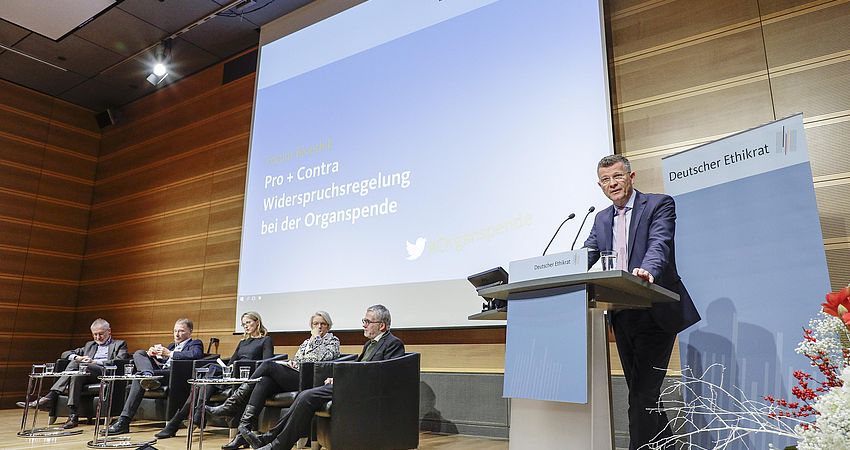Bioethics Forum
Advantages and Disadvantages of Opt-Out Organ Donation

© Deutscher Ethikrat
Topic
In Germany, more than 10,000 people are waiting for a donor organ, often for years. Concurrently, the number of organ donors is declining and has reached a low point with fewer than 800 donors in 2017. According to statistics of the German Organ Transplantation Foundation, three people on the waiting list for an organ die every day. This cannot necessarily be ascribed to a lack of willingness to donate. According to the Federal Centre for Health Education, 84 percent of the population has a positive attitude towards organ donation. However, only 36 percent own an organ donor card.
In order to remove structural obstacles to organ donation, the Federal Cabinet has decided to submit the Second Law Amendment to the Transplantation Act – Amelioration of Cooperation and Structure of Organ Donation (GZSO) to the German Bundestag for approval. In addition, a debate is taking place on whether in the future, instead of the opt-in solution introduced with the First Amendment to the Transplantation Act in 2012, an opt-out system should be established to increase the number of organ donations. Accordingly, everyone who did not explicitly decide against posthumous organ donation during his or her lifetime would become a donor. Yet, in the case of proven brain death of the potential donor, relatives can still object to the donation. In some European countries, such as France, Austria, Poland or Spain, variants of the opt-out system are already in use.
The German Ethics Council wishes to contribute to the debate in parliament and in public. As part of the series “Bioethics Forum”, the event will shed light on the pros and cons of the different regulatory options from the perspectives of medicine, ethics and law.
Video

Dieses Element setzt Cookies ein. Um es anzuzeigen, stimmen Sie bitte im Hinweisbalken dem Einsatz von Cookies zu.
Video recording (in German)
© Deutscher Ethikrat // Erratum: Die Aussage (beginnend mit 1:23:00) „Wie antworteten die Befragten? Von den 679 Fach- und Oberärztinnen und -ärzten zweifelten 16 Prozent an der Gleichsetzung. Bei den Pflegekräften war der Prozentsatz höher, nämlich 25 Prozent.“ ist folgendermaßen zu korrigieren: „Wie antworteten die Befragten? 25 % der Pflegekräfte und 16 % der Ärzte sind dieser Befragung zufolge nicht bereit, Organe zu spenden. Die Mehrheit hat Zweifel, ob man in dieser Situation tatsächlich tot ist. Andere sorgen sich um einen Missbrauch der Organspende.“
